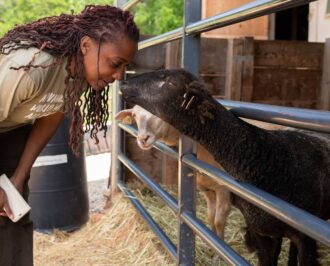GRIFFIN, Georgia - The Southern Sustainable Agriculture Research and Education (SSARE) program has selected the second class of leaders for the Sustainable Agriculture Leadership Program.
This program seeks to champion the leadership contributions of those who serve historically underserved audiences within the Southern region. Participants receive sponsorship support to conduct education or training activities about sustainable agriculture.
Targeted to historically underserved farmers and ranchers, this year’s projects cover a wide range of issues from ecologically sound management practices to edible weeds and medicinal plants. Eleven projects were supported by Southern SARE.
1. Keisha Cameron‐High Hog Farm‐Georgia: Keisha is an African American farmer who operates a family farm with an emphasis on fiber production. Her project will deal with educating farmers about sustainable fiber production.
2. Walter Mack‐Gullah Farmers Cooperative‐South Carolina: The Gullah Farmers Cooperative is an 11‐year‐old organization that organizes farmers in the Gullah-Geechee community in and around Beaufort, South Carolina. This project will provide food safety and food handling training to the cooperative members as the cooperative moves to the opening of their new food hub.
3. Cashawn Myers‐HABESHA Works‐Georgia HABESHA Works is a well‐known urban farm and urban agriculture training program in Atlanta. This project will add sustainable ag programming to a large annual event HABESHA holds each year called OrganicFest.
4. Alicia Jordan‐Triple J Farm‐Alabama: Alicia is a young African American farmer who has been working to improve the livelihoods of Black farmers in her rural area of Alabama. This project will educate Black farmers about the potential for value‐added product income from goats and sheep.
5. E’licia Chaverest‐Strategic Alignment Network‐Alabama: Elicia has worked with Southern SARE in the past through her work with the Alabama A&M Small Farm Program. She has started an organization that will provide educational opportunities to underserved farmers. The project will deal with educating farmers in Alabama about ecologically sound agriculture and management practices for Black farmers.
6. Charise Stephens‐Georgia Wellness‐Georgia: Charise has been working around issues of health and food in the city of Macon for many years. This project will focus on educating farmers and community members on establishing a foundation for urban farming within the city of Macon.
7. Kay Bell‐Global Revive‐Texas: Kay has been a long-time urban agriculture and local food system advocate in Waco, Texas. Her project will focus on educating new and beginning urban and rural farmers at a day-long conference called Better2Gether Workshop.
8. Ruth Edouard‐Carribe Ecology‐Florida: Ruth has been working with farmers in Florida to incorporate ecology-based farming practices. This project will develop educational materials around these practices and develop workshops along with web-based learning in several languages.
9. Katherine Donohoe‐Growing Minds‐South Carolina: Katherine has extensive experience teaching agriculture to individuals with various types of disabilities. Her project will be a sustainable food production day specifically focused on veterans.
10. Tixie Fowler‐Gardens for Growing‐Georgia: Tixie provides training for farmers, specifically women farmers. Her project will focus on creating a video aimed at underserved farmers about NRCS programs and how they can be the foundation to building a sustainable farming operation.
11. Muhjah Shakir- Nature’s Garden for Victory and Peace- Alabama: Muhjah is a retired professor from Tuskegee University as well as the President and CEO of Nature’s Garden for Victory and Peace. Her project will educate producers on the medicinal and food value of weeds with the goal of increasing awareness of how to market edible weeds and medicinal plants.
Southern SARE’s Equity and Prosperity Committee reviewed the applicants and chose this select group of leaders. Participants were chosen based on the project’s relevance to sustainable agriculture in the Southern region, how well it aligns with Southern SARE goals, and its impact on underserved farmers and ranchers.
Since 1988, the SARE program has advanced sustainable agriculture by supporting systems that are profitable, environmentally sound and good for communities through nationwide research and education grants program. Part of USDA’s National Institute of Food and Agriculture, the Southern SARE region funds research and grant projects, and conducts outreach designed to improve agricultural systems.
Published by the Southern Region of the Sustainable Agriculture Research and Education (SARE) program. Funded by the USDA National Institute of Food and Agriculture (NIFA), Southern SARE operates under cooperative agreements with the University of Georgia, Fort Valley State University, and the Kerr Center for Sustainable Agriculture to offer competitive grants to advance sustainable agriculture in America's Southern region. USDA is an equal opportunity employer and service provider. Any opinions, findings, conclusions, or recommendations expressed in this publication are those of the author(s) and do not necessarily reflect the view of the U.S. Department of Agriculture.
